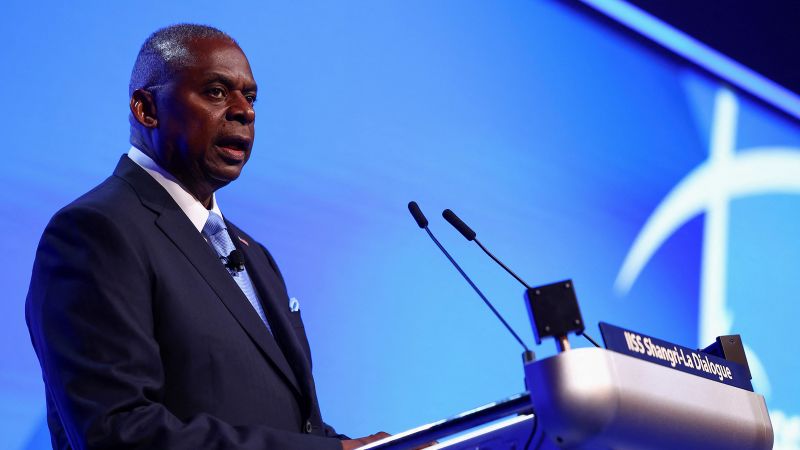Edgar Su/Reuters
U.S. Defense Secretary Lloyd Austin speaks at the Shangri-la Dialogue in Singapore June 1, 2024.
CNN
—
Defense chiefs from the United States, South Korea and Japan vowed to strengthen cooperation to deter “nuclear and missile threats” from North Korea during a meeting in Tokyo Sunday, the first of its kind in 15 years as the countries move to tighten coordination in an increasingly tense region.
The trilateral meeting comes nearly one year after a landmark summit between the three countries held by US President Joe Biden at Camp David – part of a bid by Washington to strengthen ties with two of its key allies in Asia as it eyes North Korean provocations and Chinese aggression in the region.
In a joint statement Sunday, US Secretary of Defense Lloyd Austin, Japan’s Minister of Defense Minoru Kihara and South Korea’s Shin Won-sik “recalled their enduring commitment to strengthen trilateral security cooperation to deter nuclear and missile threats” from North Korea.
They also expressed “grave concern” over the “increasing military and economic cooperation commitment” between Moscow and Pyongyang, according to the statement. Numerous governments have accused North Korea of supplying Russia with weaponry for its war in Ukraine and the two neighbors last month signed a new defense pact.
The burgeoning trilateral coordination between the US, Japan and South Korea marks a shift in regional relations, with Seoul and Tokyo – both long-standing US allies – widely seen as working to put aside historic animosity and mistrust to better address shared security threats.
Following last year’s summit, Kishida announced that annual recurring summits will be held among several of the nations’ highest officials, including the ministers of foreign affairs and defense, and national security advisers, along with the financial, industry, and commerce ministers. The leaders also announced new military exercises and a hotline for crisis communications.
The increasing coordination has sparked pushback from Beijing, which when asked about the leaders’ trilateral summit at Camp David last year said the Asia-Pacific region shouldn’t be “turned into a wrestling ground for geopolitical competition.”
Sunday’s joint statement didn’t explicitly refer to China, but the defense chiefs reiterated their opposition to “any unilateral attempts to change the status quo in the waters of the Indo-Pacific” and noted that they shared assessments of “recent maritime and air military activities in the Indo-Pacific region, including the South China Sea.”
China has been aggressively asserting its claims in the contested waters of the South China Sea, maintaining an extended presence near Japanese-controlled islands Beijing claims in the East China Sea, as well as ramping up its military intimidation of the self-ruling island of Taiwan.
The defense chiefs also formalized a trilateral agreement that reaffirms the “unwavering nature of the new era of trilateral cooperation,” according to a joint statement.
This would “institutionalize” trilateral security cooperation among their countries’ defense authorities, including senior-level policy consultations, information sharing, trilateral exercises, and defense exchange cooperation.
According to a defense official, Secretary Austin is also expected to announce that the US intends to reconstitute US Forces Japan (USF-J) as a joint force headquarters to serve as a counterpart to Japan’s Joint Operations Command (J-JOC).
Details of this implementation, which would give the reconstituted USF-J a direct leadership role “in both peace time and potential crises,” will be figured out in working groups led by US Indo-Pacific Command, according to the official.
“The intent here is for USF-J to become a standalone three-star joint force headquarters. Eventually separate and apart from 5th Air Force,” said the official, who added that there is no intention to integrate Japanese forces into the US commands.
“We view this as a historic announcement among the strongest improvements to our military ties in 70 years. Bottom line is that this is a transformative change,” the official said.
“When this transition is complete, USF-J will have a direct leadership role in planning and leading US forces in both peace time and potential crises, and they’ll be doing that side by side with Japanese forces like never before.”
#Defense #Secretary #Austin #holds #trilateral #meeting #Japanese #South #Korean #counterparts #years,
#Defense #Secretary #Austin #holds #trilateral #meeting #Japanese #South #Korean #counterparts #years
